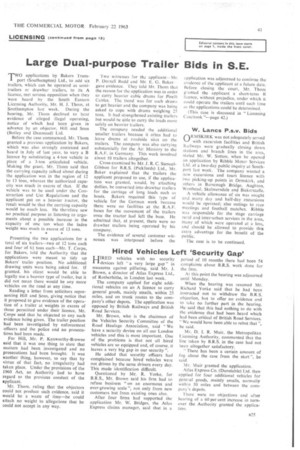Large Dual-purpose Trailer Bids in S.E.
Page 43

If you've noticed an error in this article please click here to report it so we can fix it.
0 applications by Bakers Trans port (Southampton) Ltd., to add six trailers, which can be operated as semitrailers or drawbar trailers, to its A licence, met serious opposition when they were heard by the South Eastern Licensing Authority, Mr. H. 3. Thom, at Southampton last week. During the hearing, Mr. Thom declined to hear evidence of alleged illegal operating, notice of which had been given in advance by an objector, Hill and Sons (Botley and Danmead) Ltd.
Before the case commenced, Mr. Thom granted a previous application by Bakers, which was also strongly contested and heard in July of last year, to vary a B licence by substituting a 4-ton vehicle in place of a 3-ton articulated vehicle. Making the grant, Mr. Thom said that the carrying capacity talked about during the application was in the region of 12 to 13 tons, whereas the authorized capacity was much in excess of that. If the vehicle was to be used under the Construction and Use Regulations and the applicant put on a heavier tractor, the result would be that the carrying capacity would be much less. He therefore saw no practical purpose in listening to arguments about a possible increase in the capacity of one ton when the laden weight was much in excess of 13 tons.
Presenting the two applications for a total of six trailers—two of 12 tons each and four of 61 tons each—Mr. T. Corpe, for Bakers, told the Authority that the applications were meant to tidy up Bakers' trailer position. No additional drawing units were being asked for. If granted, his client would be able to legally use a heavier type of trailer, but it did not mean there would be any more vehicles on the road at any time.
Reading a letter from solicitors representing Hill and Sons, giving notice that it proposed to give evidence of the operation of a trailer at weights in excess of those permitted under their licence, Mr. Corpe said that hc objected to any such evidence being given. The trailer position had been investigated by enforcement officers and the police and no prosecutions had been made.
For Hill, Mr. P. Kenworthy-Browne said that it was one thing to state that matters had been investigated and no prosecutions had been brought, It was another thing, however, to say that by virtue of that fact, no irregularity had taken place. Under the provisions of the 1960 Act, an Authority had to have regard to the previous conduct of the applicant.
Mr. Thom, ruling that the objectors could not produce such evidence, said it would be a waste of time—he could attach no weight to allegations that he could not accept in any way.
Two witnesses for the applicant—Mr. P. Dorrell Budd and Mr, E. G. Baker– gave evidence. They told Mr. Thom that the reason for the application was in order to carry heavier cable drums for Pirelli Cables. The trend was for such drums to get heavier and the company was being asked to cope with drums weighing 25 tons. It had strengthened existing trailers but would be able to carry the loads more safely on heavier trailers.
The company needed the additional smaller trailers because it often had to leave drums at roadside sites on the trailers. The company was also carrying substantially for the Air Ministry to the R.A.F. in Germany. This work involved about 10 trailers altogether.
Cross-examined by Mr. J. R. C. SamuelGibbon for B.R.S. (Pickfords) Ltd., Mr. Baker explained that the trailers the applicant proposed to use, if the application was granted, would, by attaching dollies, be converted into drawbar trailers for the carriage of long loads such as boats. Bakers required this type of vehicle for the German work because there were no facilities at the R.A.F. bases for the movement of the trailers once the tractor had left the base. He admitted that, at present, there were no drawbar trailers being operated by his company.
The evidence of several customer witnesses was interposed before the application was adjourned to continue the evidence of the applicant at a future date. Before closing the court, Mr. Thom granted the applicant a short-term B licence, without prejudice, under which it could operate the trailers until such time ts the applications could be determined.
(This case is discussed in "Licensing Casebook "—page 42.)
W. Lancs P.s.v. Bids
QRMSKIRK was not adequately served with excursion facilities and British Railways were gradually closing down stations and branch lines in the area, stated Mr. W. Sutton, when he opened an application by Ribble Motor Services Ltd. at a two-day public inquiry at Southport last week. The company wanted a new excursions and tours licence with two picking-up points in Ormskirk, and others in Burscough Bridge, Aughton, VVesthead, Skelmersdale and BickerstalTe.
.A vehicle allowance of six was sought and many day and half-day excursions would be operated; also outings to race meetings and football matches. Ribble was responsible for the stage carriage rural and inter-urban services in the area, many of which were operated at a loss, and should be allowed to provide this extra advantage for the benefit of the public. The case is to be continued.












































































































